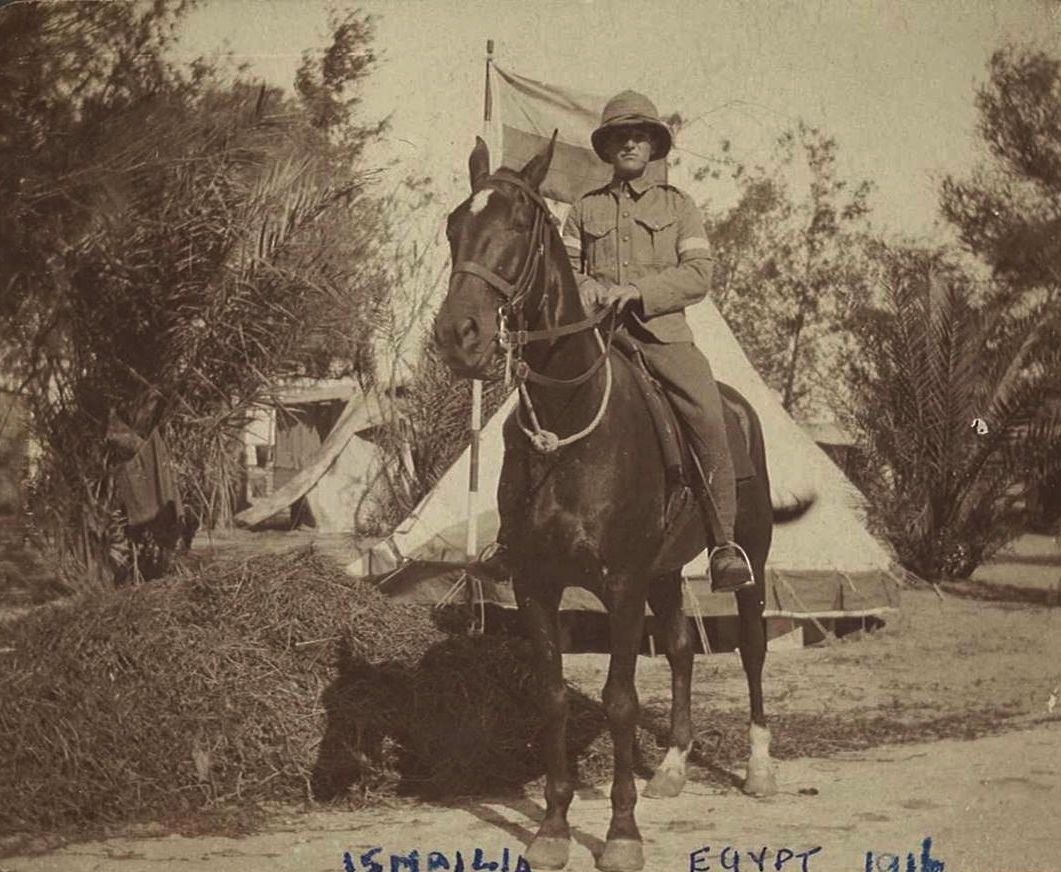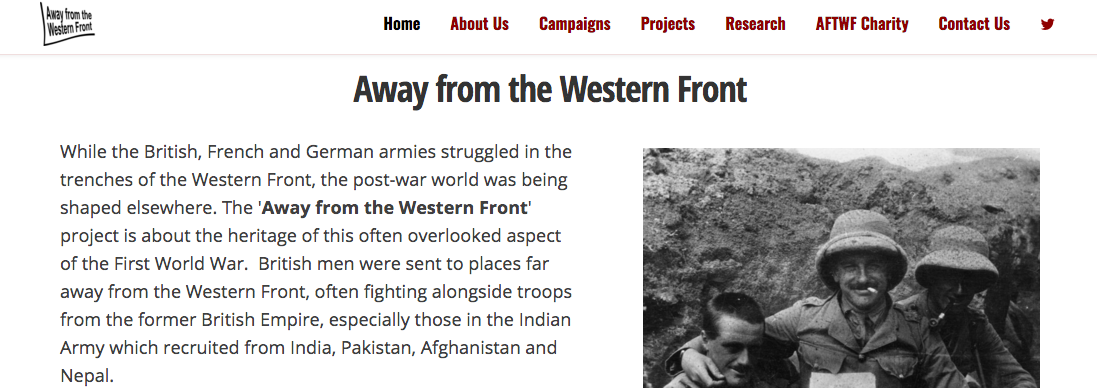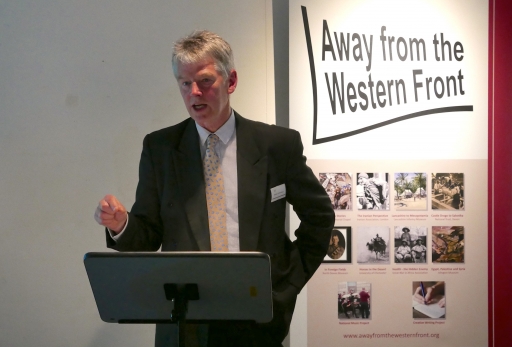Centenary News reports from the opening of ‘Away from the Western Front’, a UK-based venture aimed at raising awareness of the Great War campaigns in Africa, the Balkans and the Middle East.
“This project is about engagement”, explained National Coordinator Robin Clutterbuck.”There’s no point in having a history of a military action somewhere unless it means something to people today.”
So, creative activities, including drama, film, art and music will be used to explore the heritage of the men and women from Britain and its former empire who served on battlefields that have tended to slip out of the public eye.
“Personal meanings are the starting point for any kind of engagement,” Robin Clutterbuck continued.
“We do hope that through this project, we do give people a chance to show that there are different perspectives to this history.”
Guest speakers gave a flavour of the very different experiences of soldiers deployed ‘away from the western front’, not least the climate, and shifting front lines.
*Major Paul Knight, author of ‘The British Army in Mesopotamia 1914-1918, and a Centenary News contributor, described the capture of Ramadi from the Ottomans in September 1917 as ‘probably the most perfectly planned and executed battle of the First World War’.
*Oral historian and producer Tony T explained that for the black soldiers of the British West Indies Regiment, the Middle East was a ‘turning point,’ the moment they were allowed to fight on the front line for the first time. On the Western Front, they were restricted to labouring duties.
*Health professional Susan Burnett drew on the memoirs of her grandfather, Norman Woodcock – who served in Egypt, Mesopotamia and Palestine – to show how success on the battlefield also depended on beating diseases such as malaria, cholera and typhoid. This will be an aspect of the war explored by the lottery-funded Away from the Western Front (AFTWF) programme – see below.

Norman Woodcock was devoted to his horse Timbuc, pictured here at Ismailia, on the Suez Canal (Photo courtesy of Susan Burnett)
Away from the Western Front Projects
‘Health – the Hidden Enemy’: Health was an issue which affected all of the campaigns fought away from the Western Front. In East Africa, the vast majority of casualties were caused by illness rather than military action. AFTWF will be working alongside the Great War in Africa Association to explore the findings of a report into medical failures, relating them to modern army practices.
‘Horses in the Desert’: Thousands of horses, mules and donkeys were caught up in Great War and in this project, University of Chichester theatre studies students will work with the archives of the Swaythling Remount Depot where horses were collected and trained before being shipped overseas. Stories of individual horses will provide the inspiration for a play to be written and performed to local communities and schools.
‘The First World War – an Iranian Perspective’: As a neutral country, Iran (then still known as Persia) did not expect to be caught up in the First World War. However Britain, Russia and Germany all manoeuvred for control in the country, and the impact on the local population was severe. Away From the Western Front is working with the Iranian Association to explore this history and relate it to current Iranian and British perspectives of the war.
‘Lancashire to Mesopotamia’: Using the collections and archives of the Lancashire Infantry Museum in Preston, Lancashire County Council will work with local secondary schools, exploring the Mesopotamian campaign, with a further focus on the role of the Indian Army and the modern Iraqi perspective on the First World War.
‘In Foreign Fields’: Also linked to Mesopotamia, this project will follow the stories of young men from North Devon who travelled far away from the Western Front, experiencing wildly different cultures and environments. Participants will explore the impact on the local rural community and consider what it means to us, a century on.
‘From Islington to Egypt, Palestine and Syria:’ Islington Museum in London has transcribed the war diaries of the Finsbury Rifles. The regiment served in Gallipoli, Egypt, Palestine and Syria. The museum will work with local youth groups to create animations exploring issues arising from the campaign, and to feature the story of local railway worker Jock Christie who was awarded a Victoria Cross in Palestine in December 1917.
‘Castle Drogo to Salonika’: This country house in Devon, cared for by the National Trust (the England Wales and Northern Ireland conservation body) was being built during the First World War, to designs by the architect Sir Edwin Lutyens, who went on to play a leading role in designing the Commonwealth war cemeteries. Using detailed estate, military and social archives, local secondary school pupils will explore the story of one of the estate workers who was killed in Salonika in January 1918, and create arts activities to bring his story to a wider audience.
‘Salonika Stories’: Sandham Memorial Chapel, in the Hampshire village of Burghclere, is where British artist Stanley Spencer was commissioned to paint a series of panels based on his experiences at Salonika. This project will create a film about the campaign, and invite the local community to respond to the history and to Spencer’s evocative and spiritual paintings.
 ‘Away from the Western Front’ is funded with a £99,500 grant from the UK Heritage Lottery Fund. The project, launched on 28 April 2017, is also supported by grants from the Centre for Hidden Histories at the University of Nottingham and the British Institute for the Study of Iraq (Gertrude Bell Memorial). The latter will enable British students taking part in one of the regional projects to meet Iraqi students of the same age and exchange opinions.
‘Away from the Western Front’ is funded with a £99,500 grant from the UK Heritage Lottery Fund. The project, launched on 28 April 2017, is also supported by grants from the Centre for Hidden Histories at the University of Nottingham and the British Institute for the Study of Iraq (Gertrude Bell Memorial). The latter will enable British students taking part in one of the regional projects to meet Iraqi students of the same age and exchange opinions.
Results from project will be presented on the newly launched Away from the Western Front website, offering a long-term digital archive for public access and learning.
Images courtesy of Susan Burnett (Norman Woodcock); Centenary News
Posted by: CN Editor
